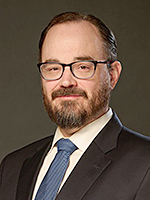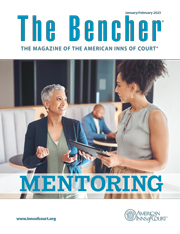Mentorship and the Evolving Practice of Law
The Bencher | January/February 2025
By Joseph C. Leonard, Esquire

 The practice of law requires the synthesis of law, regulation, and judicial holdings into cohesive legal advice. The best way to develop skill is under the guidance of a more experienced attorney, as reflected by the American Bar Association Model Rules for Ethics discussion around both competence and supervision. New associates find themselves as both full-time lawyers and full-time learners, acclimating to the professional legal landscape. Guidance and support from mentor colleagues permit a more easily navigable transition.
The practice of law requires the synthesis of law, regulation, and judicial holdings into cohesive legal advice. The best way to develop skill is under the guidance of a more experienced attorney, as reflected by the American Bar Association Model Rules for Ethics discussion around both competence and supervision. New associates find themselves as both full-time lawyers and full-time learners, acclimating to the professional legal landscape. Guidance and support from mentor colleagues permit a more easily navigable transition.
A culture of mentorship is a lifeline for young attorneys, who may feel overwhelmed by expectations. Experienced associates and partners understand that the importance of supporting new lawyers as they learn their craft is two-fold: a colleague who is not overwhelmed and feels supported is better equipped to provide value to their firm, and these young attorneys will eventually find themselves in the position of mentoring the next generation, ensuring the long-term health of a law firm.
First-year associate work can run the gamut from mundane to mind-numbing. Digesting depositions, summarizing transcripts, cite-checking case law, and tracking matter assignments are not the type of legal work that is valorized in novels, television, or film. Nonetheless, these tasks are critical to understanding the myriad pieces of work that go into representing a client’s interest before a court of law. Practice means learning how to approach hard work so that knowledge and process can be incorporated into a more complex framework as legal skills develop.
Advances in technology inevitably result in vestiges of practice left by the wayside. Physical correspondence gives way to email, Shepardizing case law becomes the work of software, and law libraries move online.
Two years ago, generative artificial intelligence (GenAI) bound into the spotlight with the release of ChatGPT. Now, ChatGPT and other forms of GenAI have firmly captured the public’s imagination, cementing itself into workflows across all sectors, including the law.
Those same first-year associate tasks are where generative AI excels. A GenAI program can summarize a lengthy deposition transcript in minutes and create a case roadmap for future reference. Attorneys and legal authorities will have to account for and vet such technology, and in turn, clients will come to expect utilization to improve turnaround time and reduce cost.
This puts pressure not only on senior attorneys working to evolve established workflows, but on young associates who may find fewer opportunities to dig into case materials and learn, not only about the facts at play in a given matter, but about how to approach tasks and digest information generally.
Mentorship is a critical piece of the practice of law that cannot be farmed out to a computer program. Attorneys must adapt and develop new ways of engaging young lawyers and identifying the spaces where they add value while ensuring that they are developing their knowledge and skills.
Last summer, the American Bar Association (ABA) published an advisory opinion, ABA Formal Opinion 512, on the use of generative AI in the practice of law, considering the core competency required to use such tools, confidentiality implications, and client consent regarding their use.
The opinion notes that due to the rapid pace of development for GenAI tools, there is no single best practice to stay abreast of their evolution. In the future, some model of GenAI tool will likely become a practice mainstay. Lawyers must understand the risks of such tools, including potential breach of confidential information and the need to validate and independently verify the tool output.
Attorney supervisory responsibilities with regard to subordinate lawyers, as addressed in Model Rules 5.1 and 5.3, mandate that clear policies for permissible and ethical use of GenAI tools must be promulgated and applied by managing attorneys. While the use of such tools may roll back some new associate responsibilities, the interplay of technology and practice provides a unique opportunity for mentorship as this new technology is established.
A clear understanding of basic GenAI technology may be a prerequisite for attorneys going forward, if only to push back on the limitations of the technology if pressed into service by clients or broadly adopted across the business landscape. Lawyers who work closely with new technology will find themselves well-positioned to mentor fellow attorneys on the use of these tools in support of their law practice.
Joseph C. Leonard, Esquire, is an associate with Morris James LLP in Wilmington, Delaware, where he leads the firm’s eDiscovery practice and advises clients in electronic discovery and information governance best practices. He is a member of the Richard S. Rodney and the Richard K. Herrmann Technology American Inns of Court.